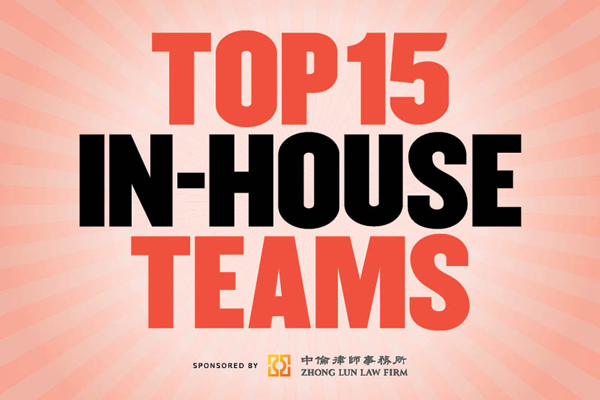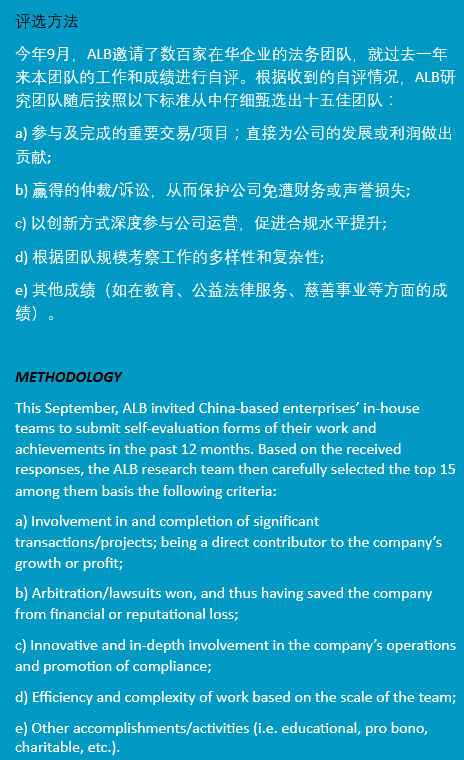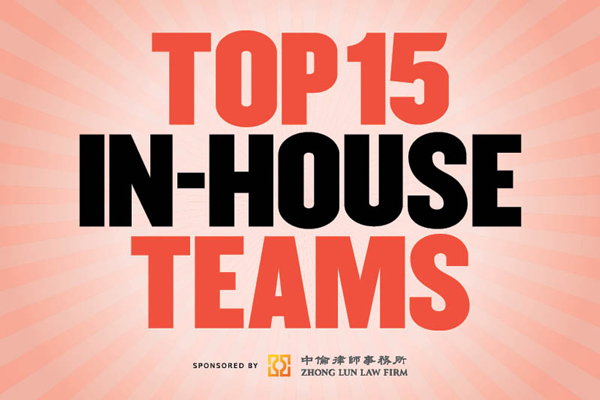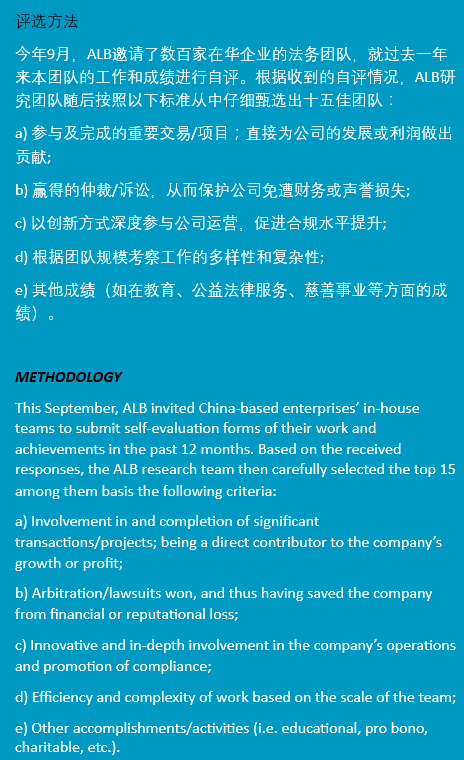
2019年的ALB China十五佳公司法务团队来自汽车、房地产、金融、能源、食品、消费、科技及互联网多个行业,在为所在企业提供高效服务的同时,他们也共同重新定义着市场对于公司法务角色的理解。
即将过去的2019年被称为“大合规之年”,国内国外,金融监管、数据、网络安全和知识产权合规等经历了前所未有的收紧,中国境内的企业发现他们再也无法“关起门来做生意”,而要承担起更多责任和挑战。加之中美贸易战等因素所引发的忧患,公司法务们不得不一刻不停地为企业保驾护航,探雷防雷。
2019年还发生了另一种变化:曾经,企业普遍将法务视为辅助型岗位,如今他们开始扮演越来越积极的角色。借助法律科技工具,法务们逐渐从繁重的日常事务中脱身而出,更积极地为公司构建治理结构,搭建合规体系,布局风险防控,甚至为新业务进行前期法律设计。
在这样的背景下,2019年ALB China十五佳公司法务团队榜单诞生了。从某种程度上说,这15支入选团队在解决好老问题的基础上,也不断重塑着中国市场对于法务行业的理解。
入选团队有的来自汽车、房地产、金融等传统行业,有的则来自科技及新兴互联网公司;有的是不到10人的紧凑团队,有的则是人数超过400的“航空母舰”。限于篇幅,我们采访了部分获奖团队,聊了聊这一年来的思考与经验。
业务变化的影响
法务团队总会在公司的业务变化中感受到最为直接的影响,这体现在了两支受访团队身上。
2019年,复星集团的战略重点从投资为主转向投资与产业运营双轮驱动,“法务团队在运营方面给予的支持越来越多。” 复星法律事务部总经理郭小舟告诉ALB。这改变了法务团队的工作内容,也重塑了其内部角色。“我们更加关注如何在项目里做好投后管理,保护复星作为投资人的权益是我们今年工作的一项挑战。法务团队积极参与到项目及整个谈判过程中,对业务团队进行积极补位,法务团队是肩并肩、甚至是牵头来做这样的事情。”
业务对团队的影响也体现在了融创法务团队身上。单是数字的变化就很惊人:2017年,融创法务团队人数为138人,两年后则增长到了现在的426人。“这主要源于公司横向、纵向的业务扩张和对法务人员持续的重视程度。”团队告诉ALB。“ 融创在2017年时还只有房地产和物业两个业务板块,之后拓展到了地产、服务、文旅、文化四大战略板块。就在几天前,公司又正式宣布布局了医疗和康养板块,融创的法务团队会继续同公司的业务触角一起延伸。”
服务企业是法务团队最重要的职责,与此同时,在2019年,法务团队的工作也很难不受到外部环境的影响。
郭小舟将2019年的外部影响总结为三点:首先是《对外投资备案(核准)报告暂行办法》对海外直接投资审批流程的影响;其次是鉴于中美贸易战,美国对于中国投资审查趋严,法务团队对牵涉到美国业务的投资都采取更加谨慎的态度;最后是欧盟《通用数据保护条例》的通过,不但改变了复星在欧洲运营的合规要求,也促使公司成立了新的网络安全与用户隐私保护部门。
而在融创法务团队看来,2019年监管机构密集发布一系列加强对房地产行业的融资要求对法务工作提出了严峻挑战,“需要在业务的开展和风控标准之间找到合适的平衡点。之前很多常见的融资模式不再适用,我们及时调整审核的工作方法和工作纪律,有效平衡了协议审核标准和资金获取效率”。
鼓舞人心的新迹象
美资企业高通则在“逆流”环境之中看到了积极信号。“2019年,中国出台了包括《外商投资法》在内的一系列重要法律,都对我们的日常工作产生了影响。总的来说,中国在外商投资、知识产权保护等方面出台的很多新举措,进一步优化了外资在华的营商环境。” 高通法务团队告诉ALB,团队也在过去一年中协助企业完成了在华合资公司的设立,并为公司在南京、重庆、青岛等地与当地政府和合作伙伴成立聚焦物联网、智能穿戴设备等领域的联合创新中心提供了法律服务。
作为国企,北汽集团感受到的则是国家层面对于企业法治要求的全面提升。“国企要做好战略转型、创新发展。同时,国企参与‘一带一路’ 倡议要求企业提升法治软实力,国有资产监管部门也对国企的法治建设提出了更高要求。”北汽法务团队告诉ALB。在这样的背景下,北汽基本形成了企业经营管理尤其是决策过程离不开法务,2019年,团队升级打造了合规体系2.0版本,推进了法律纠纷案件的有效解决,完善了集团化知识产权管理体系,并协助完成了收购戴姆勒5%股份等重要项目。
挑战引发变化
内外变动之下,法务团队也遭遇到了诸多管理及业务层面的挑战。
融创告诉ALB,虽然公司业务扩张带来了法务团队的飞速发展,但“ 业务不断扩张,对新业务的拓展、人员组成、平行部门的配合上提出了较高要求。在管理层面,如何将集团的工作标准、工作方式递延到下属子公司,同时将下属子公司在一线的经验反馈到集团并据此作出决策后再次反馈回一线,这个流程的管理效率提升和管理资源的有效利用是我们在今年发现的问题。”
北汽法务团队则将团队遭遇的挑战分为了四点:其一是国企决策层对法务的重视程度越来越高,要求团队进一步做好法务管理的顶层设计和体系建设,北汽集团董事会甚至要求以内部法律顾问的意见——而非外部律师的意见为决策依据,这对法务人员的要求非常高;其二,国际、国内对企业依法合规运营的要求越来越高,法务团队目前已经制定了百余项与业务深度融合的合规制度等;其三,法律纠纷案件数量越来越多,管理难度不断加大,法务团队因此针对发案率较高的单位或有典型指导意义的案件深入研究,以求“以案促管”。
最后一点,则是在难度不断增高的法务工作面前,优秀人才却难以引进,流失率高,且法务团队专业素养、执业能力的提升存在难点。“有个别北京市国企法务人员年流失率在30%左右,我们也在10%左右。” 北汽法务团队坦言道。“如何稳定人员,创造良好的工作环境,整合法务资源,是新时代背景下国企法务管理的大课题。”
法务创新
内外变动之下,法务团队也用创新应对着新的业务和管理需求。
复星法务团队早在2017年就采用了类似律所的新管理结构:高级法务人员被任命为“合伙人”,带领律师为不同部门及平台提供服务,这一机制在2019年得到了巩固提升:新合伙人得以任命,原有的责任分配也进一步合理化。
此外,“法务条线内部也在努力将各个事业部以及各个子公司之间的资源打通。”郭小舟告诉ALB。“今年我们与风控其他部门共同建立了风控共享中心,风控条线的能力——包括法务的能力在这个平台上会采取共享合作模式。已经搭建好的平台将于明年开始运作。”
北汽和融创团队则谈到了技术创新对于法务工作的影响。“无纸化、电子化、信息化在法务管理领域运用的愈来愈广泛。”北汽法务团队告诉ALB。“北汽集团正在完善的合同管理系统不但利于优化流程,还能智能学习及审核。2019年底要完成的合规管理系统也如此,能实现风险的智能识别、监控与控制措施的智能形成等。”融创则利用相应的软硬件设备建设了股权库、案例库等知识储备,提高了法务的工作效率和标准化程度,他们相信, “技术迭代将引发法务工作效率的革命性变化”。
变化的角色
实际上,如果说过去人们对公司法务的理解只停留在“审合同+打官司” 上,过去几年中,中国法务的工作内容不但变得更复杂,他们也从公司内部的辅助性角色逐渐向主导性角色转变,“引领型法务”成了一个经常被提及的词汇。几乎所有被访团队都感受到了这样的变化。与此同时,法务角色的变化也必然导致对于人才能力需求的变化。
郭小舟告诉ALB:“在投资项目的管理中,法务团队不仅是守卫者,还作为‘前锋’积极地参与到前线。另外,在项目里看到法律风险时,我们会第一时间主动汇报给领导而不是消极地等待询问——今年也出现过某个项目在投前会上已经批准,最后被法务叫停的情况。”
这样的角色转变要求法务“对各种业务的商业模式、行业特点以及常见风险有清晰和深刻的认识,法务必须拥有宽博的综合知识和商业嗅觉,有些方面甚至要达到业务人员的了解程度,只有这样才能透过表象发现风险点”。郭小舟说,“法务人员还要有很强的内部沟通能力。要运用同理心,以适当的方式表达意见,让业务团队知道法务其实是在帮助他们。”
融创法务团队则和ALB分享道:“ 法务工作要始终立于商业的实质、业务的基础和公司的情况,把自己看成决策者,去理解和判断,要有更加主动的意识,去获取和掌握更多的信息。作为合格的法务,除法律技能外,还要有其他两种必要技能:一方面,要根据所从事行业的特点,做相应的知识储备和技能提升;另一方面则是充分理解公司的战略和核心业务。”
高通法务团队观察到,通过与业务团队更密切地配合,法务团队有时确实会突破中后台的角色,深入到公司业务的更前端。在他们看来,作为科技公司的法务团队,需要“不断地学习,不但熟知公司的产品和科技的日新月异的发展,也要熟练使用最新法律科技工具,以便更高效地应对各种复杂的法律问题”。
北汽法务团队则认为,团队会在公司的合同审核、重大项目管理、合规管理等领域扮演主导、引领角色。“国企的新一代法务至少还需要掌握国有资产管理、行业管理相关法律法规及政策、企业管理知识。
国企对建设复合型法律人才队伍的需求也越来越迫切。”
变动的外部关系
作为公司内部法律服务的采购者,法务角色的变化也必然会引发他们和外部合作伙伴——尤其是和律所间关系的改变。受访团队告诉ALB,他们对外部律所在需求、要求和协作方式上都产生了变化。
复星2019年在业务侧重上的变化也改变了他们对于外部法律服务的需求。“以前我们和律所主要就投资进行合作,2019年在仲裁、诉讼方面的合作则越来越多,和中国律所的合作机会也增多了。”郭小舟说。他也坦言道:“选择外部律师,我们还是很重视性价比,希望他们在可预见的费用范围内提供契合需要的服务。”
对于北汽法务团队来说,法务和外部律师形成了“以内为主,以外为辅”的关系:法务显然对公司情况了解更为深入,公司绝大多数的法律与合规事务主要由法务独立高质量完成;但律所在涉及上市公司的重大疑难问题或涉外的部分重大项目方面能够提供更为专业的意见。在高通看来,法务团队往往扮演着衔接外部律所和公司管理层的角色,高通告诉ALB:“法务团队会征求律所的专业意见,再将律所的专业意见与公司实际情况相结合,提出可供公司决策层参考的建议。”
在融创法务团队看来,在更加成熟的法律环境和市场中,法务和律师往往有着更高的互动程度和更好的互相支持,“这个趋势今年在中国大陆地区更加明显……随着法务和律师交流的渠道越来越多,而且很多法务也都是律师出身,法务和律师的理解和认可程度将进一步提高。”
获奖名单 | ||
十五佳公司法务团队 | 法务团队人数 | 法务团队所在地 |
以下获奖名单按公司名称首字母排序 | ||
阿里本地生活服务公司法务部 | 30 | 杭州、北京、上海、成都 |
北京汽车集团有限公司法律与合规部 | 200+ | 北京 |
凯德中国法律与公司秘书部 | 30 | 上海 |
招商局资本管理有限责任公司法律合规部 | 8 | 深圳 |
中粮集团有限公司法律部 | 13 | 北京 |
滴滴出行科技有限公司法务部 | 73 | 北京,杭州 |
戴森法务大中华区团队 | 10 | 上海 |
复星法务团队 | 150+ | 上海,北京,纽约,悉尼及其他国家地区 |
恒生银行(中国)有限公司法律事务部 | 9 | 上海 |
79 | 北京 | |
美团点评法务部 | 100+ | 北京、上海、深圳、广州、成都等 |
网易集团法务部 | 100 | 北京,杭州,上海,广州 |
高通(中国)控股有限公司法律部 | 10 | 北京、上海、深圳 |
融创中国控股有限公司法律管控中心 | 426 | 北京 |
上海电气集团股份有限公司法务团队 | 86 | 上海 |

2019 ALB Top 15 In-House Teams
The list of ALB China Top 15 In-house Teams for 2019 is made up of companies that come from the automobile, real estate, finance, energy, food, technology and Internet industries. Apart from providing admirable support to their respective businesses, they are redefining the market’s understanding of the role of in-house teams.
The year 2019, which has almost elapsed, is referred to as the “Year of Big Compliance,” with financial regulation, data, cybersecurity and intellectual property having experienced unprecedented stringent compliance requirements both at home and abroad. Enterprises in China have found that they can no longer “do business behind closed doors” but have to take on more responsibilities and challenges. Coupled with the worries caused by the Sino-US trade war and other factors, in-house lawyers have to constantly protect the enterprises as well as to identify and prevent risks.
But 2019 also saw another massive shift. Formerly, enterprises generally regarded in-house lawyers as supporting roles, but now they are beginning to play an increasingly active role. With the help of legal tech tools, in-house lawyers gradually extricate themselves from the heavy routine works, and consequently, they can take a more proactive role in building the governance structure for the enterprises, building compliance system, designing risk prevention and control measures, and even carrying out preliminary formulation for new business in legal aspect.
Against this background comes the 2019 list of the ALB China Top 15 In-house Teams. To a certain extent, these 15 selected teams are continuously reshaping the Chinese market’s understanding of the role they are playing, and also reframing their relationships with external counsel.
Some of the selected teams come from traditional industries such as automobile, real estate and finance; some from technology and emerging internet companies; some have compact teams of less than 10 people, and some are “aircraft carriers” with more than 400 people. Owing to limited space, we inter-viewed selected award-winning teams and talked about their thinking and experience over the past year.
IMPACT FROM BUSINESS CHANGES
In-house legal teams always feel the most direct impact on the company’s business changes, which are reflected by a number of the teams named on the list. In 2019, the strategic focus of Fosun Group has shifted from investment-oriented activities to the “two-engine drive” of investment and industrial operation. “The support for operation given by the in-house team is becoming more and more,” Guo Xiaozhou, General Manager of Fosun’s Legal Department tells ALB. This has changed the business content of the team and has reshaped its internal role. “We have begun to pay attention to post-investment management.
Protecting the rights and interests of Fosun as an investor was a challenge for us this year. The in-house team has actively taken part in the project and the whole negotiation process and has actively fixed the loopholes for the business team. The in-house team works side by side with others, and even takes the initiative at times.”
The impact of business on in-house team is also reflected in the in-house team of Sunac China. The mere change in the numbers is startling: the number of Sunac’s in-house team grew from 138 in 2017 to 426 after two years. “This is mainly owing to the company’s horizontal and vertical business expansion and continued attention to legal practitioners,” the team tells ALB, “Sunac only had two business sectors, viz. real estate and property management in 2017, and then expanded to four strategic sectors, viz. real estate, services, culture-orientated travel and culture. Just a few days ago, the company officially announced the layout of the medical and health care sector, and the in-house team of Sunac will continue to extend alongside the company’s business tentacles.”
Serving the enterprise is the most important duty of the in-house team. Also, in such an “eventful time” in 2019, it is difficult for the work of the in-house team not to be affected by the external environment.
Guo summarized the external influence in 2019 into three points: first, the impact of the “Interim Measures for the Recordation (or Confirmation) and Reporting of Outbound Investment” on the examination and approval process of overseas direct investment; second, in view of the Sino-US trade war, the United States has tightened its review of Chinese investment. The in-house team takes a more cautious attitude towards investments involving US business; finally, the adoption of the EU General Data Protection Regulations not only has changed the compliance requirements for Fosun’s operations in Europe, but also has prompted the company to establish new cybersecurity and privacy department.
In the view of the in-house team of Sunac, the fact that the regulatory bodies intensively pronounced a series of strict financing requirements for real estate industry in 2019 posed a serious challenge to legal works. “We need to strike a balance between business development and risk control standards. Many of the previous common financing models are no longer applicable, and therefore we adjust the review methods and our discipline on time so to effectively balance the agreement review standards and the efficiency of fund acquisition.”
ENCOURAGING SIGNS
U.S. technology company Qualcomm, however, saw encouraging signs that could help resolve this predicament. “In 2019, China enacted a series of important laws, including the ‘Foreign Investment Law’, which have had an impact on our daily work. Generally speaking, many new measures introduced by China in the areas of foreign investment and intellectual property protection have further improved the business environment for foreign investors in China.” The in-house team of Qualcomm tells ALB that it also has assisted the enterprise in the establishment of a joint venture in China in the year and has provided legal services for the enterprise to set up joint innovation centres in the fields such as internet of things and smart wearable devices with local governments and partners in Nanjing, Chongqing and Qingdao.
As a state-owned enterprise, Beijing Automotive Group feels the overall stricter requirements for the corporate governance of enterprises across the country. “State-owned enterprises should do a good job in strategic trans-formation, as well as in innovation and development. Also, the participation of state-owned enterprises in the Belt and Road Initiative calls for enterprises to enhance the soft power of corporate governance, and the regulatory authorities of state-owned assets have also set higher requirements for formulating corporate governance in state-owned enterprises,” the in-house team of BAIC Group tells ALB. Against this background, BAIC Group has formed the operation and management, especially the decision-making process of the enterprise, which are indispensable with the services of the in-house team. In 2019, the team has upgraded and created version 2.0 of the compliance system, which has facilitated the effective resolution of legal disputes. It has improved the intellectual property management system across the Group and helped complete important projects such as the acquisition of 5 percent of the shares of Daimler.
CHALLENGES BRING RAPID CHANGES
Under the internal and external changes, the in-house team has also encountered a lot of challenges at the level of management and business.
Sunac tells ALB that although the business expansion of the company has brought about rapid development of the in-house team, “the continuous expansion of the business has put forward more demanding requirements for the expansion of new business, for the composition of personnel and the cooperation of parallel departments. At the management level, how to extend the Group’s working standards and working methods to subsidiaries, and at the same time feedback the front-line experience of subsidiaries to the Group and then feedback back to the front line after making decisions accordingly, and the improvement of the management efficiency of this process and the effective use of management resources are the problems we have identified this year.”
The in-house team of BAIC Group divides the challenges encountered by the team into four points: first, the decision-makers of state-owned enterprises give more and more importance to legal affairs, requiring the team to further do a good job in the top-level design and system construction of legal management. The board of directors of BAIC Group even requires that decisions should be made based on the opinions of in-house legal advisers rather than that of external lawyers. This requires very high standard for legal personnel; second, international and domestic standard of requirements for enterprises to operate in compliance with the law are getting higher and higher. Meanwhile, the in-house team has formulated more than a hundred compliance-related items that are deeply integrated with the business; third, the number of legal dispute cases is increasing, and management is becoming more and more difficult. Therefore, the in-house team has made an in-depth study on business units which have had a high frequency of cases arisen or study on cases with typical guiding significance, to “improve management by case study.”
The last point is that in the face of increasing difficulties of legal work, on the contrary, there are the difficulties of attracting talents to this field, high wastage rate, and the difficulties in improving the professionalism and practice skills of the in-house team. “The annual turnover rate of legal personnel in individual state-owned enterprises in Beijing is about 30 percent while we are about 10 percent,” says the in-house team of BAIC Group. “It is a major issue for the legal management personnel of state-owned enterprises in this new era to know how to stabilize staff, create a good working environment and integrate legal resources.”
IN-HOUSE INNOVATION
Under the internal and external changes, the in-house team is also responding to new business and management needs with innovation.
The in-house team of Fosun adopted a new management structure similar to that of law firms as early as 2017: senior lawyers were promoted to partners to lead associates to provide services for different departments and platforms. This structure has been consolidated and improved in 2019: new partners were promoted, and the original distribution of duties was further rationalized.
In addition, “Efforts are also being made within the legal line to link up the resources between the various divisions and subsidiaries,” Guo tells ALB. “This year, together with other risk control departments, we have established a comprehensive risk control system, and the capabilities of risk control lines – including adoption of a cooperation model that capabilities of the in-house team will be shared on this platform. The platform that has been built will start to function next year.”
The in-house teams of BAIC Group and Sunac Group have talked about the impact of technological innovation on legal work. “Paperlessness, electronics and information are more and more widely used in the field of legal management,” the in-house team of BAIC Group tells ALB. “The contract management system which BAIC Group is improving is not only conducive to optimizing the process, but also it can carry out intelligent learning and reviewing. It is the same with the compliance management system to be completed by the end of 2019, which can realize the intelligent identification of risks, the intelligent formation of monitoring and control measures, and so on.” On the other hand, Sunac has built knowledge reserves in the form of a shareholding database and a precedent case database by using the corresponding software and hardware. In this way, the work efficiency and standardization of in-house team have been upgraded. They believe that “the transition of technology will lead to revolutionary changes in legal work efficiency.”
CHANGING PERCEPTIONS
In fact, people’s understanding of the work of an in-house lawyer in the past was only concerned with “reviewing contracts and instituting lawsuits,” yet in the last few years, the work of Chinese in-house lawyers has not only become more complicated, they have also gradually changed from an auxiliary role within the company to a leading role, and “the leading type of legal personnel” has become an often mentioned term. Almost all the teams interviewed have felt such change. Also, the changes in legal role will inevitably lead to changes in the demand for the aptitude of sought-after personnel.
Guo tells ALB: “During the management of investment projects, the in-house team is not only the guard, but also it takes an active part in the front line as a ‘vanguard’.” In addition, when we see legal risks in a project, we will take the initiative to report to the leader instead of waiting passively for inquiry --- There has been a case this year in which a project approved at a pre-investment meeting was finally suspended by the in-house team.”
Such a change of roles calls for in-house lawyers to “have a clear and profound understanding of the business model, industry characteristics, and common risks of various businesses, and they must have a broad range of comprehensive knowledge and business acumen. In certain aspects, it is even expected that they will reach the under-standing level of business staff. Only in this way can we identify risks behind the veil.” Guo says, “Legal personnel also need to have strong internal communication skills. Express your opinions with empathy in an appropriate way, and let the business team know that the legal services are helping them.”
The in-house team of Sunac China shares with ALB, “Legal work should always be based on the essence of business, on the foundation of business and the particular situations of the company. Regard yourself as a decision-maker to understand and judge, and to take more initiative to acquire and master more information. As a qualified legal practitioner, in addition to legal skills, you should possess two other necessary skills: on the one hand, you should acquire more relevant knowledge and upgrade your skills according to the characteristics of the industry in which you are being engaged; on the other hand, you should fully understand the strategy and core business of the company.”
According to the observation of the in-house team of Qualcomm, through more close collaboration with the business team, the in-house team does sometimes break through the role of the middle and back offices and go further to the front end of the business of the company. In their view, as the in-house team of a technology company, they need to “keep learning, they not only need to be familiar with the rapid development of the company’s products and technology, but also need to be proficient in the use of the latest legal technology tools, to deal with the various complex legal issues more efficiently.”
The in-house team of BAIC Group believes that the team will play an important and leading role in the contract review, major project management, and compliance management in the company. “The new generation of in-house teams of state-owned enter-prises at least needs to have a good grasp of knowledge about state-owned assets management, laws, regulations and policies related to management in the industry, and enterprise management knowledge. The demand of state-owned enterprises for building an in-house team with composite type of talent is becoming more and more urgent.”
EVOLVING EXTERNAL RELATIONSHIPS
As purchasers of in-house legal services, changes in roles of in-house lawyers will inevitably lead to changes in relationships between them and external partners, especially law firms. The teams interviewed tell ALB that they have changed their demand, requirements, and ways of collaborating with external law firms.
The change of focus of the business of Fosun in 2019 has also changed its demand for external legal services. “In the past, we mainly cooperated with law firms on investment, but in 2019, there are more and more cooperation in arbitration and litigation, and there are more opportunities for cooperation with Chinese law firms,” says Guo. He also says frankly, “When we choose external lawyers, we still attach great importance to the principle of ‘good value for money’ and hope that they will provide services that meet our needs within a foreseeable range of fees.”
For the in-house teams of Qualcomm and BAIC Group, in-house lawyers and external lawyers form a complementary relationship: in-house lawyers know more about the company, but law firms can provide more professional advice. The in-house team often acts as a link between external law firms and company management. Qualcomm tells ALB, “The in-house legal team will seek the professional advice from the law firm, and then combine the professional advice of the law firm with the actual situation of the company, and put forward suggestions that can be used as a reference for the decision-makers of the company.”
In the opinion of the in-house team of Sunac, in a more mature legal environment and market, in-house lawyers and lawyers in private practice tend to have a higher degree of interaction and better mutual support. “This trend is more obvious in mainland China this year.” With the increasing channels of communication between in-house lawyers and lawyers in private practice, and the fact that many of the in-house lawyers come from lawyers in private practice, the degree of understanding and recognition between in-house lawyers and lawyers in private practice will be further improved.”
To contact the editorial team, please email ALBEditor@thomsonreuters.com.




